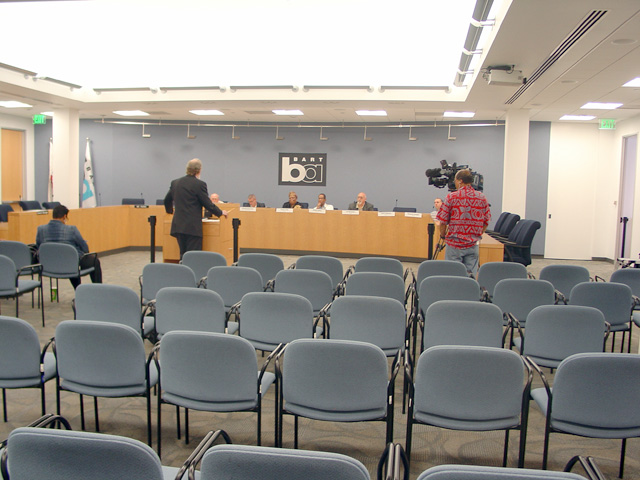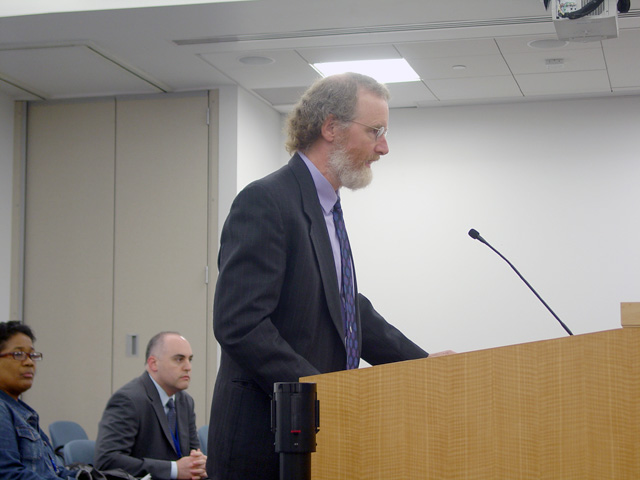BART planning further interference with common-carrier services
 [BART Citizen Review Board meeting, September 2, 2011 (photo by dave id, indybay.org)”]
[BART Citizen Review Board meeting, September 2, 2011 (photo by dave id, indybay.org)”]
We testified again last week at a poorly-publicized and sparsely-attended meeting of BART’s Citizen Review Board held late Friday afternoon at the start of the holiday weekend.
The main topic on the agenda was BART’s shutdown of wireless phone and data service in the BART transportation system during protests against shootings of passengers by BART Police, on which BART’s elected Board of Directors had requested the advice of its newly-appointed Citizen Review Board.
The mandate of the Citizen Review Board is supposed to be to review misconduct by BART Police. But they seemed reluctant to consider the misconduct of BART’s Chief of Police and Acting General Manager in ordering interference with licensed telecommunications common carriers. Our complaint that their actions may have constituted Federal crimes, in violation of 47 U.S. Code § 333, was not discussed by the Citizen Review Board, but merely referred to BART’s equally-new Independent Police Auditor, who had already told us before the meeting that he doubted he has jurisdiction to do anything about it.
 [Testimony to BART Citizen Review Board (photo by dave id, indybay.org)]
[Testimony to BART Citizen Review Board (photo by dave id, indybay.org)]
The Citizen Review Board then proceeded to take up the questions of when, how, and according to what procedures BART should engage in future interference with wireless phone and data service.
Only in response to our testimony was there any discussion of whether BART has the authority to make such decisions, either with respect to the services of telecommunications common carriers or with respect to its own services as a transportation common carrier.
A Proposed Cell Phone Service Interruption Policy was circulated at the meeting. Described as a “Draft-For Discussion Purposes”, it was referred to ambiguously as a “Board proposal”. It was unclear whether it was a proposal by some members of the Board of Directors, or a proposal to the Board of Directors, and if so, by whom. It seemed most likely, however, that it was drafted by BART’s General Counsel. Members of the Citizen Review Board had drafted a variety of position statements and draft policies on interference with phone and data service which were distributed at the meeting.
As we pointed out to the Citizen Review Board, all of these drafts and proposals illegally exceed BART’s authority, contemplate actions which would violate federal law, and should be rejected out of hand by BART’s Board of Directors. Any BART policy on denial of common-carrier service should be a content-neutral policy for when BART would petition the appropriate judicial and/or regulatory authorities to authorize such a suspension of service.
If BART thinks it needs the authority to deny service on its own, it should seek the necessary statutory and regulatory authority from Congress and Federal and state telecommunications regulators — not take matters into its own hands in vigilante fashion.
The source of the protests and the interference with cellular and transportation service is that BART, and its police, remain out of control, and that BART’s elected governing body has failed to bring them under control. As we pointed out, there would have been no more public protests if the BART board had disciplined and disarmed the out-of-control BART Police force that has unnecessarily killed two citizens in the last three years. If it’s the same police force which made the decisions to cut off public communications and public access to transit stations — as seems likely from the BART Police Chief’s public statements before the BART Board of Directors that he “takes responsibility” for these actions — then this further demonstrates that they are (still) out of control.
After discussion, the six members of the Citizen Review Board in attendance unanimously voted to recommend a list of about a dozen principles which should be included in any BART policy for interruption of cellphone service. The motion was stated verbally (audio of the meeting is posted on Indybay.org) , including (1) that “if there is time” BART should obtain permission in advance for any cellphone service interruption from a judge, the FCC, and/or the CPUC, and (2) that before adopting any such policy BART should obtain an independent opinion from outside legal counsel as to whether BART has the authority to take such action.
BART’s Board of Directors hasn’t yet scheduled when it will take up this issue again.